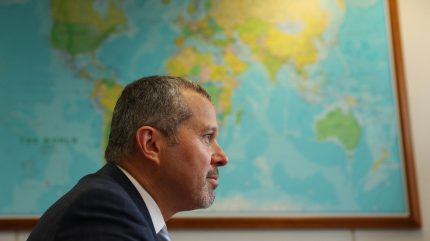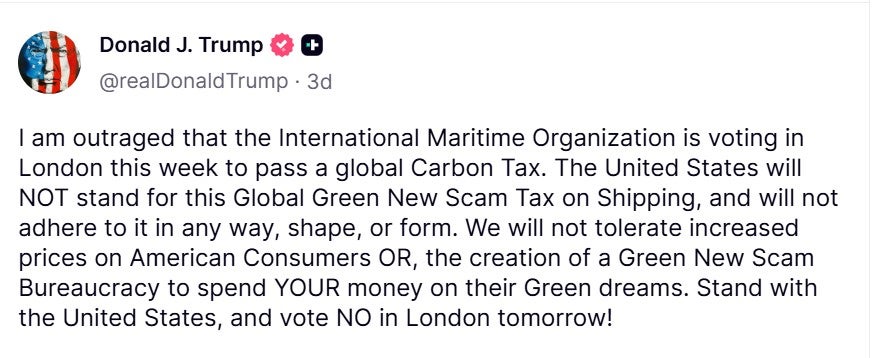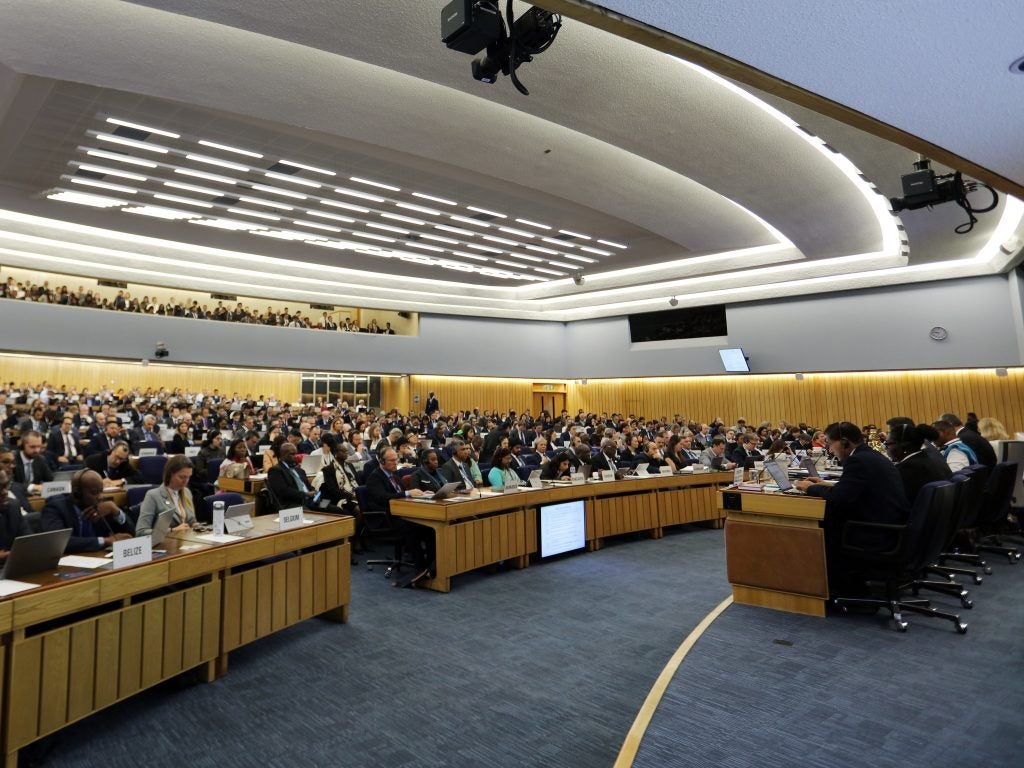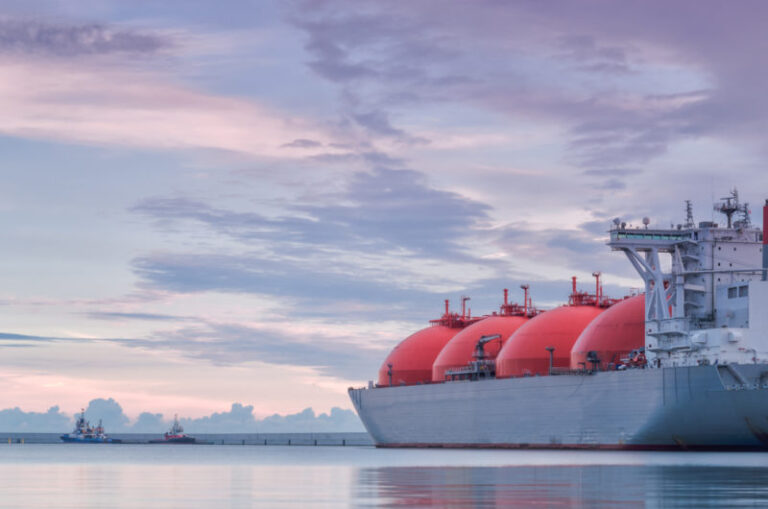

It was supposed to be a final, and relatively easy, stage of the International Maritime Organisation’s Marine Environment Protection Committee (MEPC) process to commit the global shipping industry to its Net Zero Framework. The hard battle had been fought in April at MEPC83, when the NZF and “mid term greenhouse gas reduction measures” were negotiated and agreed upon. But the steady ship began to list when the White House made a statement on Friday 10 October decrying unfair “burdens” on shipping and the “American people”. It described the NZF as an “unsanctioned global tax regime,” despite the UN body’s membership passing the measures via its usual process.
The EU issued a statement following the White House’s intervention, which reiterated the bloc’s support for the deal and suggested it should be adopted, and the IMO Secretary General Arsenio Dominguez called for continued good-faith diplomacy and said the “process has been inclusive and thorough.”
Discover B2B Marketing That Performs
Combine business intelligence and editorial excellence to reach engaged professionals across 36 leading media platforms.
As the week progressed, some reports from the IMO’s London Headquarters suggested on one hand that despite some opposition, with the US now joined by Russia and Saudi Arabia, the majority support meant spirits were high and compromise, and NZF adoption, was the likely outcome. Other reports gave a more mixed picture, and suggested the adoption of the agreed Framework would not be straightforward at all.

But on the final day the Extraordinary Session came down to a vote proposed by the Saudi delegation to adjourn the meeting for a full year. The vote passed, and delegates will “continue to work towards consensus on the IMO Net Zero Framework” in 12 months time. However, the IMO said its “Intersessional Working Group on the Reduction on Greenhouse Gas Emissions from Ships, scheduled to meet 20 to 24 October 2025, will go ahead to continue work on the guidelines for implementing the Net Zero Framework.”
57 delegations voted for the year-long adjournment, 49 voted to oppose it, and 21 abstained.
IMO Members and stakeholder reactions
The response from many actors in the global shipping industry has been negative, but due to the political nature of the IMO and its discussions, very few shipping lines or vessel owners have publicly stated their views on the delay.
The IMO’s Dominguez was clearly unhappy with the highly politicised debate, and said “It is the time to really look back at how we have approached this meeting. My plea to you is not to repeat the way we have approached this meeting for future discussions.”

Thomas A. Kazakos, International Chamber of Shipping Secretary General, made clear that what the sector needed was clarity on future regulations and therefore the delay would not help the wider shipping industry.
“We are disappointed that member states have not been able to agree a way forward at this meeting. Industry needs clarity to be able to make the investments needed to decarbonise the maritime sector, in line with the goals set out in the IMO GHG strategy. As an industry we will continue to work with the IMO, which is the best organisation to deliver the global regulations needed for a global industry,” he said.
Kostas Gkonis, Secretary General of INTERCARGO shared one of the more positive reactions, saying the delay was “an opportunity for further dialogue” and restating the association of dry bulk ship owners’ commitment to the IMO. This was a heavy hint that INTERCARGO does not want to see the fracturing of regional regulations that some are worried may follow the adjournment.
“Following IMO’s decision regarding the Net Zero Framework, INTERCARGO reaffirms its support to the IMO as the sole global regulator capable of delivering coherent and effective measures for international shipping. We wish to see the current postponement as an opportunity for further dialogue. The time ahead should be used constructively and effectively to bridge differing positions among IMO Member States and to also ensure that the industry’s voice and input are heard and taken onboard.
“We invite Member States at IMO to work more closely among them but also in partnership with the shipping community towards agreeing on a regulatory framework that is realistic, practical, and globally workable,” Gkonis concluded.
One of the firms that has shared a view on the collapse of the Extraordinary Session was OceanScore, which has delveoped a suite of tools to help shipping operators comply with emissions regulatuons like FuelEU.
In OceanScore’s view the vote to delay the NZF adoption “marks a turning point for shipping.”
“The vote wasn’t just procedural; it undermines the MEPC’s role and multilateral climate action as a whole. A one-year delay won’t change the political blockers.
With no clear global path forward, rules are now moving in different directions. Planning fuel, engine, and efficiency investments just became riskier and more expensive.”
“Regional rules will surge: the UK may extend its ETS to international voyages, and others could follow. With FuelEU Maritime now locked in, shipowners must hard-wire C/P and SHIPMAN clauses — waiting time is up,” it added.
Unsurprisingly, the most vocal group reacting to the delay have been companies engaged in cutting shipping emissions, and environmental groups.
Smart Green Shipping’s CEO Diane Gilpin said it was no surprise, and the lack of a centralised plan to cut the industry’s carbon output is a continunation, not a change. “While the decision by the International Maritime Organization’s Marine Environment Protection Committee (IMO MEPC83) to postpone adoption of the IMO Net Zero Framework by one year is disappointing it’s not surprising. There’s never been a sensible global emissions policy that helps the industry transition to sustainable practices,” she said.
Others, including Delaine McCullough, Ocean Conservancy’s shipping program director, had stronger criticisms for delegates.
“The failure of IMO member states to clinch this agreement is a major setback for people and the planet. It’s disgraceful that climate action has been delayed when we see the devastating impacts every day, and when shipping fuels have been tied to 250,000 premature deaths and 6 million cases of childhood asthma every year.
“The agreement would have required ships across the globe to slash their greenhouse gas emissions, driving a sector-wide switch from dirty fossil fuels to zero-emission options, including harnessing the power of wind to traverse the ocean and running on new fuels produced from 100% renewable energy. The agreement would have slashed carbon emissions and saved lives. A world without this agreement is dirtier and more dangerous for people, wildlife and the ocean.”
However, McCullough pointed to future IMO actions that could assist climate efforts. “While the agreement was not perfect, it was an important step to deliver on the IMO’s commitment and send clear signals to an industry that was not only asking for a global framework, but actively supported this deal. While this delay is a serious setback, there is still a major opportunity to put the sector on a zero-emission pathway. In April 2026, the IMO will continue the revision of its main energy efficiency measure, the Carbon Intensity Indicator (CII), which would reduce fuel burn through technical and operational measures like simply slowing ships down. Strengthening the CII is absolutely critical to immediate emission reductions, necessary to meet the IMO’s 2030 goals.”
Lukas Leppert of German-based The Nature and Biodiversity Conservation Union (NABU), a Maritime Beyond Methane (MARBEM) partner, highlighted the economic losses from the delay alongside the environmental price.
“The outcome of today is disappointing. The international community has a clear obligation to protect the climate in shipping. In times of geopolitical uncertainty, today’s decision could have sent a strong signal for global climate protection and multilateralism. Instead, delays and obstacles have jeopardized more than a decade of negotiations.
“A package of measures to gradually replace fossil fuels and technologies, like LNG, and to relieve the burden on the climate and the environment was on the table. The path of delaying will lead to significantly higher economic costs and climate damages that will extend far beyond the shipping sector and into future generations.”
European presure group Transport & Environment accused the US of “bullying” over climate action, and lauded the European Union for continuing its efforts.
Alison Shaw, IMO Manager at T&E, said: “The delay leaves the shipping sector drifting in uncertainty. But this week has also shown that there is a clear desire to clean up the shipping industry, even in the face of US bullying. The world cannot let intimidation and vested interests dictate the pace of climate action. Climate-ambitious countries must use this moment to build a strong majority in support of meaningful decarbonisation. They will be the ones that benefit from the economy of tomorrow, not the geopolitical power games of the past.”
T&E’s general statement added: “Crucially, the EU must continue to strengthen its own green shipping ambitions and retain its own maritime policies which now stand as the only substantive regulations to tackle shipping emissions in the void left by the IMO NZF. Bold regional action is still possible with or without the US.”
“MEPC ES2 adjourned abruptly after a vote called by Saudi Arabia, who continually referred to the IMO as a ‘House Divided’. For us who have been participating in the process since pre GHG Strategy, this house was only divided by the divisive actions of one bad actor (not named here) giving power to the latent negativity that we have overcome through delicate negotiations for years,” she said.
“Peace is not a passive state. It is a balance of constant dialogue and compromise. For the first time in my experience here, certain parties refused to move their position, continuously seeking to undermine the process,” MacLaine opined.


